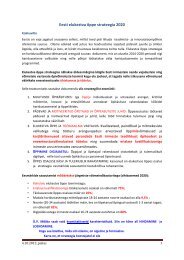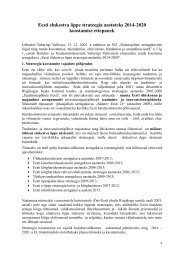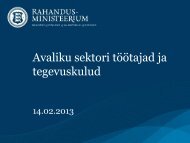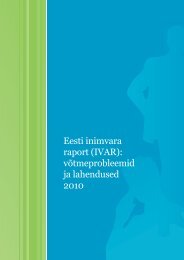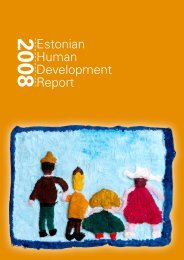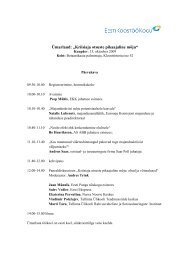DEVELOPMENT
The pdf-version - Eesti Koostöö Kogu
The pdf-version - Eesti Koostöö Kogu
Create successful ePaper yourself
Turn your PDF publications into a flip-book with our unique Google optimized e-Paper software.
Lithuania, 61%; and in Russia, 69%. In the global corruption<br />
report compiled in 2004, a clearly more positive<br />
attitude toward public authority could be seen among<br />
the Estonian elite, as compared with Lithuania, Latvia<br />
and Russia. If 39% of the Estonian elite agreed with the<br />
statement that the representatives of public authority<br />
are dealing with their personal interests, in Russia, the<br />
respective indicator was 61%, in Latvia 55% and in Lithuania<br />
51% (Steen 2004).<br />
When we examine the changes in Estonia’s position<br />
based on the corruption perception for the last<br />
ten years, we see a somewhat different picture. Estonia’s<br />
ranking in the corruption perceptions index list<br />
has constantly deteriorated during the named period<br />
(see Table 2.5.1). Estonia’s highest position was achieved<br />
in 2006 (24 th place); then, we fell by three to four places;<br />
remained there; and declined again, during the last two<br />
years. During the last six years, Estonia’s position has<br />
worsened by eight places. Based on the corruption perceptions<br />
indicators, Estonia has not drawn closer to the<br />
Western and Northern European countries, but rather,<br />
decreased its gap with the former socialist states. A shift<br />
in the same direction is also occurring in the attitudes<br />
of the public toward the abuse of power in Estonia. The<br />
cases of political corruption, which have regularly been<br />
disclosed recently, have increased people’s concerns<br />
about political corruption and the transparency of<br />
governance.<br />
The last two GRECO reports dealt with political<br />
corruption in Estonia. In 2008, the report included<br />
several proposals for improving oversight over political<br />
party financing. As of the beginning of 2012, of the eight<br />
recommendations regarding the regulation of the criminalisation<br />
of corruption, five had not been implemented,<br />
two were partly implemented and one has been satisfactorily<br />
implemented. In its newest report, which deals with<br />
the prevention of corruption among parliament members,<br />
judges and prosecutors, GRECO made seven recommendations<br />
for improving the work of the Estonian Parliament<br />
(Riigikogu). Among other things, the report dealt<br />
with establishing rules for people who try to influence<br />
the drafting of legislation, for the establishment of codes<br />
of ethics, for subsequent job restrictions for members<br />
of parliament and for the declaration of their economic<br />
interests (GRECO 2012).<br />
2.5.2<br />
Summary<br />
As compared to the majority of the former Eastern bloc<br />
countries, the extent of the corruption in Estonia has<br />
been assessed as rather modest. Estonia’s anti-corruption<br />
strategy, are primarily concerned with simpler<br />
forms of corruption, the so-called “lower level” of<br />
corruption, i.e. activities which are mainly related to<br />
the honesty and transparency in business. If foreign<br />
companies, which represented the Western-style business<br />
and management culture, played a large role in<br />
the economic reorganisation, we were left, more or less,<br />
on our own, when it came to the development of the<br />
political culture.<br />
The international organisations have repeatedly<br />
indicated to the danger of political corruption, the<br />
negative impact of which on the Estonian development<br />
has become increasingly evident in recent years. An<br />
essential role has also been played by our inexperience<br />
and the lack of a consistent policymaking tradition. We<br />
are often not able to see the importance of stability and<br />
ethical values in institutional activities, compared to<br />
personal gain and interests. Self-criticism is inhibited<br />
by the wrong habit of hiding any shortcomings behind<br />
a shiny façade.<br />
References<br />
1. 2012 Corruption Perceptions Index – www.transparency.org/<br />
policy_research/surveys_indices/cpi/2012/results<br />
2. GRECO 2012 – http://www.korruptsioon.ee/greco<br />
3. Karklins, R. (2005). The System Made Me Do It: Corruption in<br />
Post-Communist Societies. Armonk, NY, London: M.E. Sharpe.<br />
4. Koch, A. (2012). Corruption Perceptions Index 2012 and the<br />
European Financial Crisis. http://www.transparency.org/policy_research/surveys_indices/cpi/2012/results<br />
5. Lipset, S., Lenz, G. (1999). Corruption, Culture, and Markets.<br />
Manuscript, George Mason University, Arlington, VA.<br />
6. Mauss, M. (2000/1924). The Gift: The Form and Reason for<br />
Exchange in Archaic Societies. New York: W.W. Norton.<br />
7. Nations in Transit 2012 – www.freedomhouse.org<br />
8. Sandholtz, W., Taagepera, R. (2005). “Corruption, Culture, and<br />
Communism,” International Review of Sociology, 15, 1, 109-131.<br />
9. Steen, A. (2004). “How Elites View Corruption and Trust in<br />
Post-Soviet States,” Global Corruption Report 2004: Special<br />
Focus: Political Corruption. London; Sterling, VA: Pluto Press /<br />
Transparency International.<br />
Estonian Human Development Report 2012/2013<br />
85



